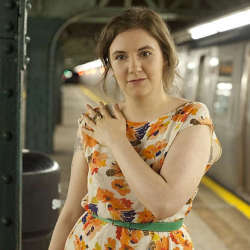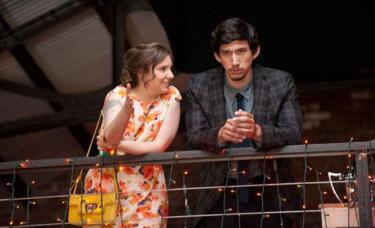
Lena Dunham might be the most divisive director of her generation. Self-deprecating, incisive, witty, aware to a fault, she’s what would happen if Diane Keaton and Miranda July met and had tea using Amy Heckerling as a footstool. But at the same time, her characters and their individual dilemmas are direct reflections of their generation, behaviors indicative of a group of twenty-somethings who devoured Palahniuk and shit out Klosterman. They Know What They’re Doing And They Are Smarter Than You. Hipsters cum Proselytizers. Join us or be deemed irrelevant.
I’ve talked with several co-workers, friends, relatives who’ve watched either Tiny Furniture or Girls (or both) and find her writing and her characterizations insufferable. Others still find it remarkable and on-the-nose, a young woman (or girl, if you will) entirely aware of her faults and vices and dealing with them through humor and observation.
The question then is: is that something we want to watch?
I found Tiny Furniture to be a remarkable film with a very clear voice, but it left me with this surreal feeling of sadness. There was this longing I had for her to just change, move forward, beat the stagnation. But her toiling in those waters, wafting slowly in the endless sea of uncertainty, is the point of the film. The same way that we leave her at the end of the first season of Girls.
 Season One - MVP. Perfect line readings, perfect pitch.
Season One - MVP. Perfect line readings, perfect pitch.
Hannah’s friends/counterparts, all in one way or another, have made a step forward (or so they believe). Jessa is married, impulsively, basking in the warm glow of adulthood. Marnie ever so subtly rejects the advances of her ex and calls for a truce with Andrew Rannell’s Elijah. Practicing maturity and perfecting it. Even Shoshanna finally loses her virginity to Ray willingly, aching for this breach in her womanhood. But Lena does something truly remarkable in the last five minutes of the season finale, a creative touch that solidified and even elevated the previous season in my eyes. Her Hannah loses her boyfriend, loses her purse, loses her way. (‘Where am I?’ she yells, dazed and confused as she wanders off a metro to a group of onlookers (similar to her in age) across the tracks.) Are they on the right side or the wrong side? And really, where the fuck is she?
She manages her way to the outskirts of New York near Coney Island, barefoot and broken, and busts out some leftovers and takes a few bites. Sound of seagulls all around, her watching the sea, licking her fingers in a particularly nice, adolescent touch. She’s lost, but fuck, what else is she going to do?

This brought Antoine Doinel to mind, at the end of The 400 Blows. While some are going to scoff at the notion of comparing Truffaut to Lena Dunham, to me, it makes sense. He’s broken free, runs, and stops at the ocean. Where do I go now? It’s not a stretch to imagine the two of them sitting side by side, Hannah sharing bits of her crumble cake with the young boy, as they both continue to waft in their own respective oceans, waiting for a wave.
Few directors working are willing to show you that horror of finding yourself lost and with no direction anywhere. Few directors anywhere are willing to acknowledge the lack of a current, and the danger of sinking.
Lena Dunham, to my mind, has accomplished so much in such a short period of time specifically because she gets it. What it is to wait for a change to happen. What can you do when you know you have to, but you don’t know how to begin?
You wait. You sit down, acknowledge where you are, acknowledge that you’re lost, and wait.

Wait for the current to come in.

Lena Dunham and her Girls return to HBO on January 13th. Watch it.

